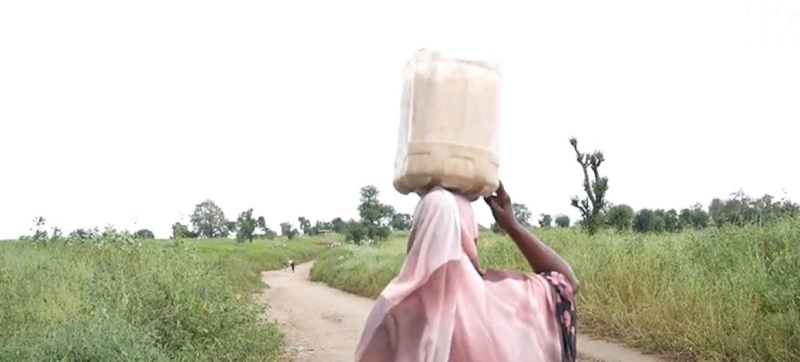
Amid the conflict and dire security situation, women and girls in Sudan are often victims of violence. The photo shows a woman who had to walk several kilometers alone in an unsafe area to buy flour for her family. A year of war in Sudan: UN provides assistance to victims of violence Healthcare
“I can’t forget this moment. I can’t forget their smell. I can’t forget their faces. This moment will haunt me until my death.”
26-year-old Fawzia fled her hometown in Sudan to escape gun violence. The country has been at war for a year, causing the world’s worst displacement crisis, with some 6.5 million people fleeing their homes to other parts of Sudan. More than 1.7 million people left for neighboring countries.
“I had to run away,” says Fawzia. “One family offered me shelter, but after three hours of fighting, armed people burst into the house. “Where are you hiding your weapons?,” they shouted.”
Fawzia and the people who sheltered her were not armed. The father of the family was shot dead right in front of his wife and children.
Read also:
UN experts call to prevent another year of war and violence in Sudan
“The men told me to go into the next room and bring them something to eat,” Fawzia continues her story. “Three of them came in behind me and locked the door. One pointed a gun at my head and ordered me to take off my clothes. When I refused, he shot into the roof.” She was thrown to the floor and raped.
“I was vomiting, I was crying. After they left, a woman came into the room, covered me and started crying with me,” recalls Fawzia.
Fawzia’s story is one of countless stories of sexual violence that has spread like an epidemic across Sudan since the war began. In a climate of widespread cruelty and impunity, people are afraid to seek help or seek justice.
Sexual Violence as a Weapon of War
Because of the war, millions of people in Sudan are starving, and attackers often take advantage of their desperate situation.
“After hiding for a month, we ran out of food,” says 14-year-old Sarah. “I went outside with my sister to find something to eat. As a result, three armed men began to chase us. My sister managed to escape, but I was raped. I was unconscious for several hours,” she says. She was discovered by several elderly women who recognized her and took her to her mother.
Kidnappings for sexual violence have also increased sharply in conflict-affected areas. For 22-year-old Shakra, an evening at her friend’s house turned into a nightmare. “Four men pushed me into a car, we drove somewhere for two hours. They raped me and left me there for two days without water or food,” the girl recalls. As a result, she was able to find representatives of her tribe in the area, who sheltered Shakra in their home.
Pregnant women have nowhere to look for help
System Health care in Sudan has also been seriously affected by the conflict. About 80 percent of hospitals in areas where fighting is taking place are no longer functioning due to staff shortages, with many health workers fleeing the violence.
In the wake of this disaster, 150,000 pregnant women in the country who are internally displaced cannot receive adequate medical care.
“None of us have stable jobs or resources to meet our needs, such as medical care,” said Amina, who fled her home in the capital. Khartoum. “We rely on the free services provided by mobile clinics,” she adds.
UN Mobile Teams
Mobile Clinics were sent to Sudan by the United Nations Population Fund (UNFPA). Thanks to them, people in remote and hard-to-reach areas receive help. The staff of such clinics, in particular, provide emergency obstetric care and medical care to women who have been subjected to violence.
“One woman suffering from pregnancy complications had to be carried 10 kilometers on a donkey cart,” said Zainab, a midwife working with a UNFPA mobile team in Gezira state.
Currently, a total of 33 mobile clinics have been deployed throughout the country, and 64 safe facilities have been established to protect and treat victims of violence.
Due to the unstable situation Medical staff are often unable to return home after finishing their shift. “I go away for three days, attending birth after birth,” says Fatima, a midwife in Khartoum. “On the fourth day I return home to rest. Then I start again,” she adds.
“Lifebuoy”
In Darfur, Khartoum and Kordofan – areas where fighting is heaviest – more than 7,000 new mothers could die in the coming months if they do not receive essential medical and food assistance. About 1.2 million pregnant and lactating women will suffer from acute malnutrition, significantly increasing the risk of illness and death among both mothers and newborns.
UNFPA works with partners to provide reproductive health services and help victims of violence. Over the past year, more than 700,00 thousand people received support from the fund.
“They offered us a lifeline,” says Amina.
